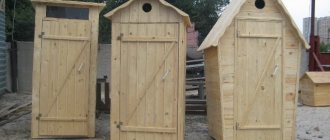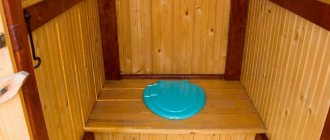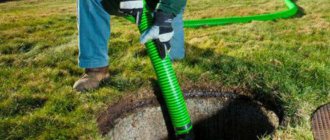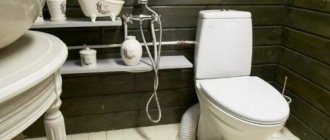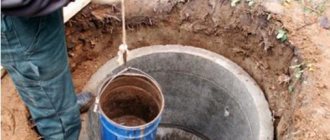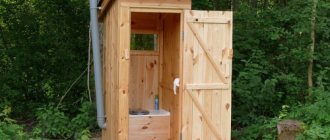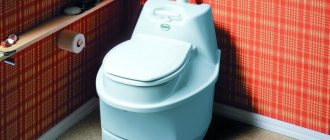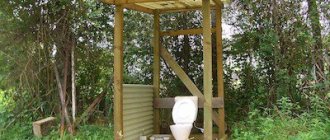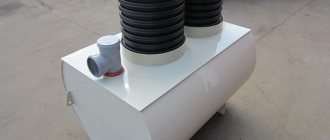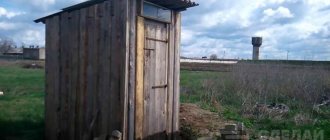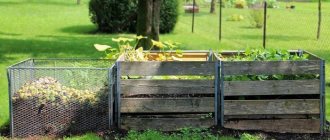Tired of the smell of the toilet in your country house? We know how to remove it and what is needed for this.
Imagine an idyll. You are at your dacha, inviting your friends to a spring barbecue. The sun is warming, the guitar is playing. The nostrils are tickled by the aroma of fried meat and your outdoor toilet with feces that have successfully accumulated all winter.
The suburban paradise is over. Only chronic sinusitis can save you from the smell of a cesspool, or our 5 simple tips. Follow them and you will be able to bring your loved ones and friends to your lands. And without the risk of inhaling waste.
Causes
To cope with an unpleasant odor in an outdoor toilet, it is important to establish the causes of its occurrence. To do this, it is worth understanding the design features of the room. An outdoor toilet is a small cubicle with a hole. They often make a toilet seat on it. Under the cabin there is a cesspool intended for feces. This becomes the source of bad odor. As feces decompose, biogas is released, which consists of 60% methane, ammonia, and hydrogen sulfide. These substances not only spoil the air, but can also cause serious poisoning .
Disadvantages of cesspools
Before you start making a country toilet, you should consider installing a cesspool - see options for building cesspools of different designs. A special tank is needed to collect waste. And to prevent the spread of odors, you will need a pit with a sealed bottom. But this option requires systematic pumping.
Note! A good solution for a cesspool is to install a drainage bottom. The liquid will quickly be absorbed into the soil, and particles of the solid structure will settle. With significant accumulations of waste, siltation of the bottom may occur. And for such a case, special cleaning will be required. First, contaminants with solid waste are removed, and then the filter bottom is restored.
The following points should be noted among the disadvantages of a cesspool:
- To maintain and care for a country toilet, you will need financial investments. When the tank is full, pumping is necessary, carried out regularly.
- Even with high-quality sealing, you cannot protect yourself from the occurrence of an unpleasant odor in the country toilet.
- After some time, the walls begin to let in sewage and contaminate groundwater.
If a sewage system is installed at the dacha, it is necessary to come up with ways to insulate the container. In severe cold weather, sewage may freeze, which causes difficulties in using the system.
How to arrange ventilation
To prevent the appearance of an unpleasant odor, it is recommended to provide an exhaust hood even during the construction of the toilet. If it is not there, you should put a pipe in the cesspool box. After which she should be taken outside. This can be done through the roof. It is important to ensure that the outermost part is located 2.5-3 meters from the ground surface. The insertion area should be covered with sealant, and the pipe fragment above the roof should be painted black. When exposed to heat, the pipe will begin to heat up. Thanks to this, it will act as a hood.
The pit should reach a depth of 2 meters. It is recommended to make it from waterproof material. It is also permissible to organize natural ventilation in the toilet. To do this, it is recommended to make a hole near the floor or a window.
Source
Cut grass
The next available method for eliminating odor in a toilet in a summer cottage is to use mowed grass. This filler appears during the lawn mowing season. The herb has a pleasant aroma that is stronger than the smell in the toilet. Placing a handful of grass clippings on your bowel movements after using the toilet is enough.
Recent Entries
Chainsaw or electric saw - what to choose for the garden? 4 mistakes when growing tomatoes in pots that almost all housewives make Secrets of growing seedlings from the Japanese, who are very sensitive to the soil
We do ventilation - natural and forced
Natural ventilation occurs due to the movement of air heated to different temperatures. In the toilet, for this purpose, a window is made above the door, and holes in the side walls. It is advisable not to glass the window above the door, otherwise it will not perform its functions. To reduce the number of insects, it can be covered with mesh.
A window above the door - not only for daytime lighting, but also for ventilation
Side ventilation holes are made at the bottom. You can cover it with the same mesh or install decorative grilles. The presence of holes at different levels ensures good air movement, which minimizes odor.
Exhaust ventilation is also necessary - a pipe from a cesspool or a box with a waste container next to it. The easiest way is to make it from a plastic pipe with a diameter of 100 mm. Its height should be 50-70 cm above the roof of the toilet. You will also need a 90° corner and an umbrella for the top (or a deflector, if you find a suitable one) to prevent foliage from flying in.
How to remove a pipe from a cesspool or waste container
Make a hole in the toilet wall equal to the outer diameter of the pipe. Insert a short piece of pipe and mount a corner to it. All this can be attached to the wall with clamps.
Fasten the pipe to the wall with clamps
If you install a fan in the pipe, we get forced ventilation. If there is no fan, it will be natural - air movement will be provided by temperature differences and wind.
Traditional methods of combating odor in country toilets
The established practice includes a whole set of sequential actions to eliminate the stench from a public restroom. At the first stage, the main task must be solved - to prevent gases from accumulating in the pit by ensuring ventilation . The next step is to try to influence the biochemical reactions in the fecal sludge to make it safer for human health and the environment, and possibly suitable for subsequent use.
DIY ventilation system for an outdoor restroom
If there is no ventilation system in the country toilet, it will not be difficult to make one yourself. Such modernization does not require large financial investments and the use of complex technologies.
PVC pipes are best suited for constructing a ventilation system: they are resistant to chemical and thermal influences
The ventilation system of an outdoor restroom should include ventilation of both the toilet stall and the cesspool. In most cases, natural ventilation is used: gas is removed due to air draft - the circulation of warm air upwards and cold air downwards.
The booth can also be equipped with a forced ventilation system, which will draw out odors using an electric fan. This option helps get rid of the smell in the toilet in a private house, where it is easier to install electricity. Extending an electrical cable from a country house to a garden and insulating it from moisture will be much more difficult and expensive.
If you have a natural ventilation system, you should not install a fan directly into the cesspool of a country toilet. This can disrupt natural ventilation and lead to additional costs - the purchase of a special fan and high energy consumption. A fan in the booth itself will be enough.
Cabin ventilation
There are several ways to ensure air exchange in the booth. Simplest :
- in the upper corner on the rear wall of the cabin (10-15 cm from the roof level) cut a hole through which warm air with a smell will be removed;
- in the lower corner of the opposite wall (15-20 cm from the floor level) cut a hole for fresh air.
The holes should be covered with decorative grilles or a mesh with small cells. This will protect the booth from insects.
The second method is a little more complicated : you should insert an angled plastic pipe of the appropriate diameter into the rear upper hole, and a piece of straight pipe into it, securing it with a clamp and fasteners on the toilet wall. The pipe should be 1.5 m above the level of the cabin roof to ensure better traction. A deflector (cone-shaped umbrella) should be placed on the upper end of the pipe. Its presence will increase ventilation performance by 30% and protect the ventilation system from leaves, branches and precipitation getting into it.
You can find out more about what a Khanzhonkov deflector is and how to make it at home from the presented video:
All cracks in the structure should be sealed with construction foam or sealant. A tight lid on the toilet will also protect against the penetration of odors from the pit and help improve the quality of ventilation in the stall.
Cesspool ventilation
When arranging a cesspool ventilation system, it is better to use pipes with a diameter of at least 100 mm.
Necessary:
- cut a hole in the pit flooring along the diameter of the pipe;
- lower the pipe through the hole into the hole 50-70 cm;
- place a deflector or conical roof on the upper end of the pipe to prevent debris and moisture from entering the ventilation system;
- secure the pipe to the rear wall of the booth using clamps.
The entry point of the pipe into the pit must be sealed with sealant and antiseptic
It is advisable to paint the pipe protruding above the roof of the cabin black - this will contribute to its heating by the sun's rays and increase traction.
The ventilation pipe from the cesspool should rise 50-70 cm above the cabin
Folk remedies for eliminating unpleasant odors from the restroom
An important advantage of using folk remedies is that they not only allow you to eliminate the stench, but also affect the biochemical processes occurring inside the fecal matter.
In rural areas, there has long been a practice in the summer to pour into the pit every time you go to the toilet:
- a small amount of sawdust.
- ash, peat or a mixture of ash and peat;
- cut grass;
- tops and shoots of tomatoes, nettles. Tomato waste should be thrown in in large quantities, nettles - up to 200 g once a week.
Nettle, like tomato tops, absorbs ammonia in the pit, destroys aerobic bacteria, kills fly larvae and drives away adult insects
In addition to the fact that such products are practically cost-free, they are completely safe for the environment. In addition to neutralizing odor, they speed up the processing of the contents of the pit into compost, which allows it to be used as fertilizer in the future. The only disadvantage of such methods will be the rapid filling of the space under the toilet.
There are drugs on sale that have similar effects - bioactivators, which consist of special bacteria that can quickly process human waste into compact residues that are practically devoid of an unpleasant odor. The main disadvantage of such funds is their cost.
Near village latrines they place special boxes with sawdust and a dustpan.
You can learn more about the properties of tomato tops and how best to use them to eliminate odor from a cesspool in the video:
Dry toilets
Installing a cesspool is far from the best solution when building a toilet. Today there are other methods of waste disposal that, when used correctly, do not emit any odor at all. If you want to have an odorless country toilet, install a compost or peat toilet, which is also called a powder closet.
The essence of such a toilet is that after each visit, all waste is covered (powdered) with peat, sawdust or a mixture of both. Small particles block contact with air, there is almost no smell. In the case of a cesspool, peat also works, but the volumes there are large and it is impossible to completely block access. Although with regular addition of peat the method works well.
Source
Method 5. Peat
Another material that helps eliminate the unpleasant odor coming from the country toilet is peat. By constantly adding it to the cesspool, you can not only get rid of unnecessary aroma, but also, as in the case of tomato tops, get rid of annoying flies.
The disadvantage of this product is that not everyone has the opportunity to get peat for free. And regularly purchasing special peat mixtures that are used for dry closets is not the cheapest pleasure.
How to eliminate it using folk remedies?
You can cope with an unpleasant odor using folk remedies. Plant residues, peat and ash are popular among summer residents.
Plant residues (tops)
This is the most affordable tool that is available in every area .
Its main advantage is the absence of any financial costs. Any vegetation can be used as an odor neutralizer:
- nettle,
- tomato tops,
- cut stepsons,
- weeds, etc.
The method of application is very simple - a small amount of weed should be added to the pit after each visit to the toilet.
Nettles and tomato tops are administered once every 7 days . These plants not only neutralize odors, but also help get rid of flies.
However, this method has several disadvantages. The first is that the cesspool will quickly overflow, which is why you will have to call a vacuum cleaner. Secondly, it will not be possible to completely neutralize the smell.
To combat the smell in an outdoor toilet, you can use the ash left after burning dry grass or other waste. They use it in the same way as tops - add 1 scoop after each visit to the toilet.
Sawdust
You can muffle the smell with sawdust.
Like other folk remedies, they are poured into a hole after each use. Sawdust composts natural human waste . To avoid having to constantly run around the area with a mug, you can install a separate box in the toilet for sawdust.
Sawdust is an inexpensive material. However, it will not be possible to completely neutralize the odor. In addition, the cesspool will have to be emptied mechanically more often.
You can get rid of the smell using peat . You need to add it regularly, after each visit to the latrine. An additional benefit of peat is that it helps keep flies away. It is safe for ecology and the environment, absorbs fumes.
The main disadvantage of this method is the need to purchase peat mixtures, which can be expensive for summer residents.
Method 6. Chemicals
Chemicals are also used to get rid of odors in country toilets. They - it must be admitted - have many advantages:
- Unlike folk remedies, they are more effective and completely neutralize unpleasant fumes. In addition, after using them, the smell from the toilet disappears faster.
- Chemicals can be used at any temperature: they are equally productive both at minus 20°C and at plus 20°C.
- Most chemicals used to clean toilets not only eliminate odors, but also disinfect cesspools.
- Many drugs have a fairly low price.
All chemicals used to eliminate odors in outdoor toilets can be divided into several groups:
- Formaldehyde . Until recently, due to their low cost, they were the most popular of all chemicals. However, due to their high carcinogenicity, they have recently been almost never used.
- Bleaching powder. Like formaldehyde, it is cheap, so summer residents resort to its help every now and then to remove odors. However, despite its attractive price and its disinfecting properties, it is used less and less. The reason is the harm that bleach causes to humans and the environment.
- Ammonium preparations. These products promote the rapid decomposition of waste products, have disinfecting properties and quickly eliminate the smell in the country toilet. However, due to the extremely negative impact on human health, they can only be used if it is possible to completely eliminate human contact with the fumes of ammonium salts.
- Nitrate oxidizers. Of all the chemicals used for cleaning country toilets, nitrate oxidizers are the most gentle. They cause the least harm to nature and humans and at the same time do an excellent job of eliminating odors. The contents of the cesspool after their use can even (albeit with some restrictions) be used as fertilizers. One of their main disadvantages is their high cost.
And now it’s time to learn about the negative sides of chemicals for cleaning country toilets:
- The most important disadvantage is the harm that all chemicals (some to a greater extent, others to a lesser extent) cause to the environment and human health. As a result of their use (the plots are small), some of the “chemistry” will definitely end up in the beds, some will end up under trees and bushes, etc.
- Aggressive exposure to chemicals will reduce the life of metal products (corrosion) and even some plastics if such materials are encountered in their path (for example, metal walls of a cesspool or a plastic ventilation pipe).
- The decomposition products remaining after exposure to chemicals will have to be pumped out and removed, because their use will lead to soil contamination.
Biologically active additives
Dietary supplements are often used instead of chemicals, as they have a high safety profile.
Their main advantages:
- They do not harm the environment or human health. They contain bacteria that process organic matter into a harmless mass. The waste stops emitting gases and the smell disappears.
- It is enough to use dietary supplements 1-2 times per season, depending on how actively you use the toilet.
- Complete elimination of odor.
- Reduce waste volume. This allows you to save on the services of vacuum cleaners.
- No negative impact on the material from which the toilet is made. Additives do not spoil plastic, wood and metal.
The method of using dietary supplements depends on the chosen product, but there are few significant differences. Universal instructions for use:
- dilute the product in water and mix thoroughly;
- pour the composition into the cesspool;
- inspect it after 3-4 days - if foam appears on the surface, the bacteria have begun their work.
You can find various biological supplements on sale. Most popular brands:
- Sannitree. Biogranules for country toilets with a cesspool. The drug is based on an enzyme composition that is safe for humans and living organisms. The price of a 100 g package is 50 rubles.
- Bioforce. Biological product for dry toilets. It is produced in the form of a gel. Price 1 liter – 600 rubles.
- Bioforce Professional . A biodegradable preparation for country toilets effectively eliminates unpleasant odors. Available in tablet form. Price – 70 rubles for 5 pieces.
Bioactivators for country toilets
Bioactivators are modern drugs that are a concentrate with strains of biobacteria. For these bacteria to live, they need a sufficient amount of organic matter, moisture and an air temperature above 0°C. The most popular bioactivators for cesspools:
- Dr. Robic;
- Sanex;
- Micropan.
Such biological agents help in waste disposal by neutralizing sewage in the cesspool, destroying harmful microorganisms and eliminating unpleasant irritating odors. When using bioactivators, the filling of the cesspool decreases over time.
You can purchase the bioactivator in the form of liquid, powder or tablets. In an ordinary country toilet, only 1 tablet may be enough to cope with 1 cubic meter of sewage. The products must be used according to the instructions indicated on the packaging.
Rules for the use of bioactivators:
- if you decide to use bioactivators, try to prevent chemicals from getting into the cesspool, otherwise living microorganisms may simply die;
- be sure to monitor the ventilation of the toilet;
- in early spring or late autumn it is pointless to use bioactivators, since microorganisms die at low temperatures;
- Correctly correlate the volume of waste and the required number of microorganisms. If there are too few of them, they will not cope with the task and simply will not survive.
The results of the bioactivators become noticeable about a week after their use.
How to remove an unpleasant odor using special chemicals?
You can get rid of the smell in an outdoor toilet using chemicals. Top 3 effective remedies:
Roetech K-47
Means for maintaining country toilets and septic tanks . Using this product allows you not only to get rid of odor, but also to reduce the volume of solid fractions. One bottle is enough for six months of regular use. The cost of a 0.946 liter package is 690 rubles.
Bioforce
Formula for country toilets . This deodorizing agent helps neutralize unpleasant odors. It is recommended to use it once a month. A 0.5 liter tank will require 500 ml of gel. The price of a 1 liter package is 500 rubles.
Thetford B-Fresh Green Toilet Liquid
Sanitary gel allows you to get rid of unpleasant odors and liquefies waste . For 1 use, 75 ml of liquid product is required. The composition can be used for ordinary country toilets and dry closets. A 2 liter canister costs 600 rubles.
Chemicals must be used strictly according to instructions.
Ventilation
If the ventilation system in the room was provided at the stage of its construction, then the problem is solved by itself. When the air vent has not been taken care of, you need to build it yourself.
When heated in the sun, it will create additional draft , promoting high-quality removal of gases. A canopy is installed on top that will prevent precipitation and debris from entering the pit.
If there is no desire to install a pipe, then a window made in the wall can play the role of ventilation. It is recommended to place one hole as low as possible to the floor, and the second from above - at a distance of 15 cm from the ceiling. This will ensure the natural movement of air flows and its purification. To prevent insects from entering the toilet through the hole, it is sealed with mesh.
To make ventilation as efficient as possible, it is recommended to combine two methods - installing a pipe in a cesspool and making vents in the walls.
Biological products (bioactivators) against odors in outdoor toilets
Recently, preparations obtained from bacteria living in the soil, which process the contents of country toilets, have become especially popular.
Important! It is worth considering that these drugs will only work at positive temperatures. Also, you should not add bleach to the toilet, otherwise it will kill all living bacteria.
Such biological products for cesspools and septic tanks include:
- Inta-vir;
- Successful;
- Clean house (more specifically for septic tanks);
- Sanex;
- Micropan;
- Doctor Robik (quite expensive and more suitable for private homes);
- Economics;
- Unique.
Video: biological preparations for country toilets
They are quite simple to use: the product must be diluted in water according to the instructions , poured into a cesspool, and then the bacteria will work independently without your help.
The main advantage of using such products based on living bacteria is their complete environmental friendliness and safety , in other words, they will not harm anyone in our summer cottage (its soil). In addition to the fact that they eliminate unpleasant odors, they are generally originally intended for the disposal of toilet waste (for their decomposition). But under no circumstances should you throw away or pour chemical waste into a cesspool, because it can destroy all living bacteria.
By the way! These drugs are available in liquid, powder and tablet form . Depending on the volume of your cesspool or septic tank, purchase exactly the right amount in the appropriate form.
Video: products for country toilet
Dry toilets outside
Dry toilets are a special type of latrine that does not use water. Many summer residents choose them because they are very easy to care for. Such devices are used both indoors and outdoors.
Main varieties:
Composting toilets. In them, waste is completely converted into compost, which practical gardeners use on the site as fertilizer.- Dry toilets with separate urine collection. They separate feces from urine into different containers.
- Dry toilets with chemical filler. They are small in size and suitable for short-term use.
- Toilets with different types of waste disposal: incineration, packaging and freezing. These devices are practical to use, but have a high cost, which can exceed 50,000 rubles.
The main advantage of all dry toilets is the absence of odor.
Helpful information
Tips that will be useful to all owners of outdoor toilets:
- in addition to treating the cesspool with special means, the toilet must be washed regularly using antiseptics;
- You can use air fresheners indoors—devices that operate automatically are convenient;
- the cesspool should be cleaned regularly - if it is overfilled, no strong remedy will be able to cope with the unpleasant odor;
- you need to think about the ventilation system at the stage of constructing the toilet;
- Chemicals must be used carefully, as they are not always safe for humans and the environment.
You will find a lot of useful and important information about removing various unpleasant odors from objects and surfaces in this section.
